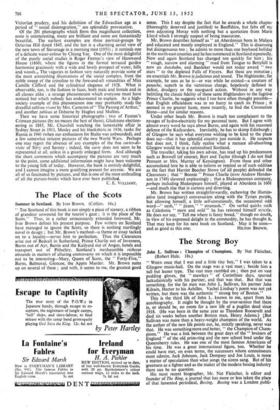The Place of the Scots
Summer in Scotland. By Ivor Brown. (Collins. 16s.) THE Scotland of this book is not simply a piece of scenery, a ribbon of grandeur unwound for the tourist's gaze ; it is the place of the Scots." Thus, in a rather unnecessarily extended foreword, Mr. Ivor Brown defines his present purpose. Few writers on Scotland have managed to ignore the Scots, so there is nothing startlingly novel in design ; but Mr. Brown's method—a theme or essay tacked on to a locality—serves him to perfection. Thus the Clearances arise out of Badcall in Sutherland, Prince Charlie out of Inverness, Burns out of Ayr, Barrie and the Kailyard out of Angus, hotels and transport out of Pitlochry. Scotland's inexhaustible richesse abounds in matters of alluring controversy on which it is impossible not to be interesting—Mary, Queen of Scots, the " Forty-Five," Burns, Balmoral, Glencoe, the Appin Murder. Mr. Brown sums up on several of these ; and with, it seems to me, the greatest good sense. This I say despite the fact that he awards a whole chapter (thoroughly deserved and justified) to Banffshire, but fobs off my own adjoining Moray with nothing but a quotation from Marie Lloyd which I strongly suspect of being inaccurate.
Mr. Brown describes himself as" an Aberdonian born in Malaya and educated and mostly employed in England." This is disarming but disingenuous too ; he admits to more than one boyhood holiday in the north-east counties and he has summered in Scotland repeatedly. Now and again Scotland has changed too quickly for him ; his "rough, narrow and alarming" road from Tongue to Bettyhill is now an Autobahn, and Baedeker would not today award "two stars " to the depleted Falls of Foyers. But these are minutiae ; on essentials Mr. Brown is judicious and sound. The Highlander, for example, he sees as he is—or was while he existed—a creature of panache, superb in the victbrious charge, hopelessly deflated in defeat, drudgery or the rearguard action. Without in any way belittling the classic fidelity of these same Highlanders to the fugitive Prince Charlie, he suggests what I too have often thought possible— that English officialdom was in no hurry to catch its Prince ; it seemed in no greater haste, more recently, to find the Coronation Stone—and for similar reasons.
Under other heads Mr. Brown is much too complaisant to the ravages of hydro-electricity for my personal taste. But I agree with almost every word he says about Burns, and again with his reasoned defence of.the Kailyarders. Inevitably, he has to skimp Edinburgh ; of Glasgow he says what everyone wishing to be kind to the place does say—that it has splendid country just outside it. He suspects but does not, I think, fully realise what a menace all-absorbing Glasgow would be in a nationalised Scotland. The traveller, taking his own advice, has read up his predecessors such as Boswell (of course), Burt and Taylor (though / do not find Pennant or Mrs. Murray of Kensington). From these and other accumulated lore he is able to-inform or remind us of such oddities as the fact that Harriet Beecher Stowe (of all people) defended the Clearances ; that " Bonnie "Prince Charlie (teste Andrew Hender- son in 1749) slavered unpleasingly ; that a Shakespearean company, perhaps including Shakespeare himself, played at Aberdeen in 1601 —and much else that is curious and diverting.
Mr. Brown has written straightforwardly, eschewing the illumin- ative (and imaginary) conversation along with the Tyrian purple, but allowing himself, a little self-consciously, the occasional odd word—" nesh," " jizzen," " stramash.;' On verbal quirks such as Caledonia " stern and mild" he has rationed himself strictly. He does not say," Tell me where is fancy bread," though no doubt, in View of his expressed delight in the commodity, he has thought it. That may keep for his next book on Scotland. May it be soon—


































 Previous page
Previous page